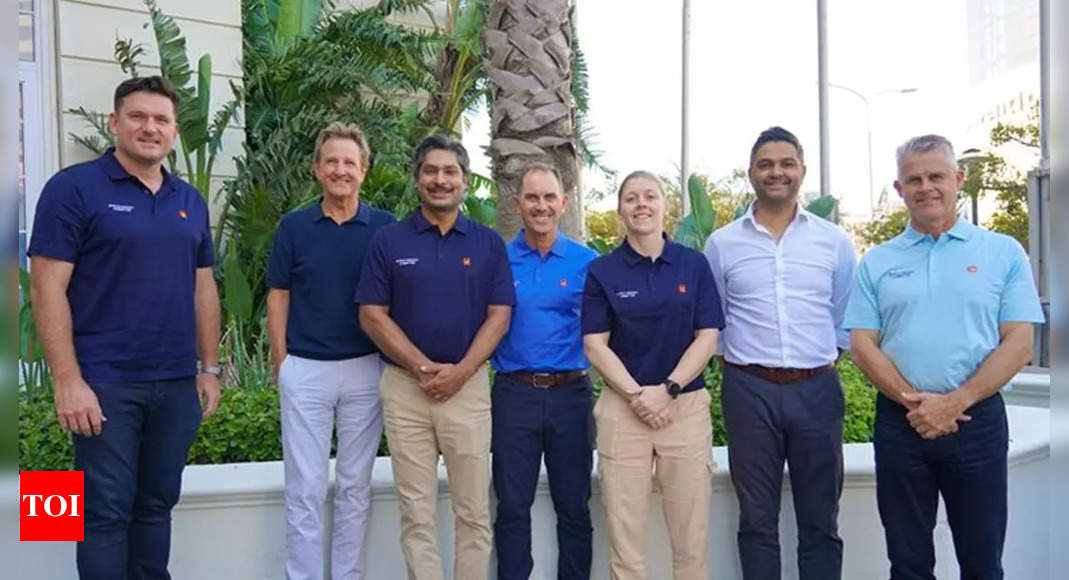MUMBAI: The Marylebone Cricket Club’s (MCC) World Cricket Committee, which is headed by former Sri Lankan captain and wicketkeeping great Kumar Sangakkara, has recommended that men’s Test series be played across a minimum of three matches from the next ICC Future Tours Programme (FTP) from 2028 onwards.
Following a meeting in Cape Town of it’s WCC, the prestigious club, which is headquartered at Lord’s in London, released a statement which said: “The meeting occurred in the immediate aftermath of two fantastic men’s Test matches played in Brisbane and Hyderabad, which excited supporters of the Test match format, yet also left them ruing the absence of a possible third match decider in the Australia vs West Indies two match series.In support of the thrilling Test cricket currently being played and the importance of sustaining the traditional format of the game, the WCC recommends men’s Test series be played across a minimum of three matches from the next ICC Future Tours Programme (FTP) from 2028 onwards.”
Even the India versus South Africa Test series in December-January in South Africa, which ended 1-1, consisted of just two matches.
The MCC’s World Cricket Committee chairman is former Sri Lankan captain and wicketkeeping great Kumar Sangakkara, while former India captain Sourav Ganguly, Jhulan Goswami, Ramiz Raja, Graeme Smith, Eoin Morgan, Heather Knight, Kumar Dharamsena and Justin Langer being amongst its members.
While admiring the role of India for driving the wealth in the global game, the WCC called for new growth markets for the game, and in that context, backed the ICC’s decision to stage the men’s T2-0 World Cup in the USA and West Indies. “The game owes a debt of gratitude to India, with its insatiable thirst for cricket driving the wealth in the global game. However, this reliance upon India belies the fact that the game needs to identify new markets to ensure its global growth, at a time when media rights beyond the current cycle are by no means guaranteed. With this uncertainty identified and on the back of the momentum built through this year’s ICC Men’s T20 World Cup in the USA and Caribbean and the build up to the 2028 Olympics in the USA, the acceleration of the USA as a growth market for cricket would seem a natural consideration,” WCC stated.
The WCC also called for the distribution from the media rights deal in the next cycle to be more equitable, thus reducing the financial gap between the members.
“The has long understood that the record media rights deal negotiated for broadcasting ICC events from 2024-2027 has delivered global cricket a generational opportunity over the upcoming four-year period. However, what has also become clear is that, despite this significant capital injection, many are doubting if it will deliver tangible universal gain. Whilst some have prospered, many full and associate members are clearly struggling. This gap is growing and if not addressed will affect the playing and, perhaps more importantly, the development programmes of the less-affluent, perhaps irrevocably, leading to a greater disparity of competitiveness. The WCC feels the ICC full member nations should take a more collegial approach to ensure that this period concludes with the global game in the strongest possible health,” the WCC said in a statement.
Sangakkara stated: “It’s time for courageous leadership and a united vision for the global game. Whilst the opportunities for cricket are enormous, the challenges are equally great and there must be a stronger sense of collegiality amongst full members and all stakeholders for cricket to thrive.”
Following a meeting in Cape Town of it’s WCC, the prestigious club, which is headquartered at Lord’s in London, released a statement which said: “The meeting occurred in the immediate aftermath of two fantastic men’s Test matches played in Brisbane and Hyderabad, which excited supporters of the Test match format, yet also left them ruing the absence of a possible third match decider in the Australia vs West Indies two match series.In support of the thrilling Test cricket currently being played and the importance of sustaining the traditional format of the game, the WCC recommends men’s Test series be played across a minimum of three matches from the next ICC Future Tours Programme (FTP) from 2028 onwards.”
Even the India versus South Africa Test series in December-January in South Africa, which ended 1-1, consisted of just two matches.
The MCC’s World Cricket Committee chairman is former Sri Lankan captain and wicketkeeping great Kumar Sangakkara, while former India captain Sourav Ganguly, Jhulan Goswami, Ramiz Raja, Graeme Smith, Eoin Morgan, Heather Knight, Kumar Dharamsena and Justin Langer being amongst its members.
While admiring the role of India for driving the wealth in the global game, the WCC called for new growth markets for the game, and in that context, backed the ICC’s decision to stage the men’s T2-0 World Cup in the USA and West Indies. “The game owes a debt of gratitude to India, with its insatiable thirst for cricket driving the wealth in the global game. However, this reliance upon India belies the fact that the game needs to identify new markets to ensure its global growth, at a time when media rights beyond the current cycle are by no means guaranteed. With this uncertainty identified and on the back of the momentum built through this year’s ICC Men’s T20 World Cup in the USA and Caribbean and the build up to the 2028 Olympics in the USA, the acceleration of the USA as a growth market for cricket would seem a natural consideration,” WCC stated.
The WCC also called for the distribution from the media rights deal in the next cycle to be more equitable, thus reducing the financial gap between the members.
“The has long understood that the record media rights deal negotiated for broadcasting ICC events from 2024-2027 has delivered global cricket a generational opportunity over the upcoming four-year period. However, what has also become clear is that, despite this significant capital injection, many are doubting if it will deliver tangible universal gain. Whilst some have prospered, many full and associate members are clearly struggling. This gap is growing and if not addressed will affect the playing and, perhaps more importantly, the development programmes of the less-affluent, perhaps irrevocably, leading to a greater disparity of competitiveness. The WCC feels the ICC full member nations should take a more collegial approach to ensure that this period concludes with the global game in the strongest possible health,” the WCC said in a statement.
Sangakkara stated: “It’s time for courageous leadership and a united vision for the global game. Whilst the opportunities for cricket are enormous, the challenges are equally great and there must be a stronger sense of collegiality amongst full members and all stakeholders for cricket to thrive.”










